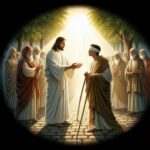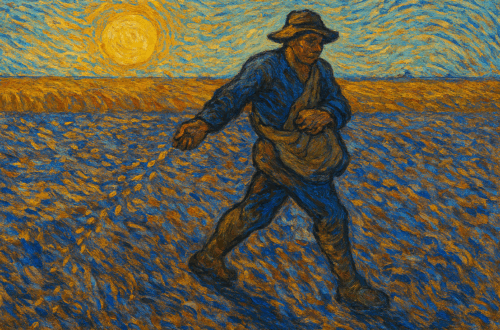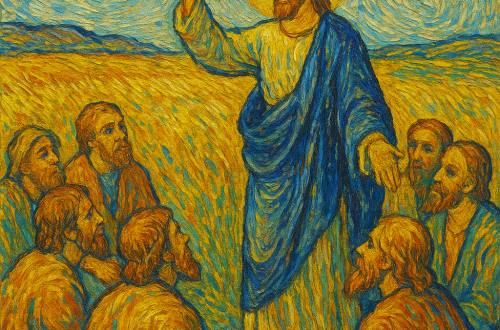
John 9: Jesus Heals a Man Born Blind

1 As he went along, he saw a man blind from birth.
2 His disciples asked him, “Rabbi, who sinned, this man or his parents, that he was born blind?”
3 “Neither this man nor his parents sinned,” said Jesus, “but this happened so that the works of God might be displayed in him.
4 As long as it is day, we must do the works of him who sent me. Night is coming, when no one can work.
5 While I am in the world, I am the light of the world.”
6 After saying this, he spit on the ground, made some mud with the saliva, and put it on the man’s eyes.
7 “Go,” he told him, “wash in the Pool of Siloam” (this word means “Sent”). So the man went and washed, and came home seeing.
8 His neighbors and those who had formerly seen him begging asked, “Isn’t this the same man who used to sit and beg?”
9 Some claimed that he was. Others said, “No, he only looks like him.” But he himself insisted, “I am the man.”
10 “How then were your eyes opened?” they asked.
11 He replied, “The man they call Jesus made some mud and put it on my eyes. He told me to go to Siloam and wash. So I went and washed, and then I could see.”
12 “Where is this man?” they asked him. “I don’t know,” he said.
The Pharisees Investigate the Healing
13 They brought to the Pharisees the man who had been blind.
14 Now the day on which Jesus had made the mud and opened the man’s eyes was a Sabbath.
15 Therefore the Pharisees also asked him how he had received his sight. “He put mud on my eyes,” the man replied, “and I washed, and now I see.”
16 Some of the Pharisees said, “This man is not from God, for he does not keep the Sabbath.” But others asked, “How can a sinner perform such signs?” So they were divided.
17 Then they turned again to the blind man, “What have you to say about him? It was your eyes he opened.” The man replied, “He is a prophet.”
18 They still did not believe that he had been blind and had received his sight until they sent for the man’s parents.
19 “Is this your son?” they asked. “Is this the one you say was born blind? How is it that now he can see?”
20 “We know he is our son,” the parents answered, “and we know he was born blind.
21 But how he can see now, or who opened his eyes, we don’t know. Ask him. He is of age; he will speak for himself.”
22 His parents said this because they were afraid of the Jewish leaders, who already had decided that anyone who acknowledged that Jesus was the Messiah would be put out of the synagogue.
23 That was why his parents said, “He is of age; ask him.”
24 A second time they summoned the man who had been blind. “Give glory to God by telling the truth,” they said. “We know this man is a sinner.”
25 He replied, “Whether he is a sinner or not, I don’t know. One thing I do know. I was blind but now I see!”
26 Then they asked him, “What did he do to you? How did he open your eyes?”
27 He answered, “I have told you already and you did not listen. Why do you want to hear it again? Do you want to become his disciples too?”
28 Then they hurled insults at him and said, “You are this fellow’s disciple! We are disciples of Moses!
29 We know that God spoke to Moses, but as for this fellow, we don’t even know where he comes from.”
30 The man answered, “Now that is remarkable! You don’t know where he comes from, yet he opened my eyes.
31 We know that God does not listen to sinners. He listens to the godly person who does his will.
32 Nobody has ever heard of opening the eyes of a man born blind.
33 If this man were not from God, he could do nothing.”
34 To this they replied, “You were steeped in sin at birth; how dare you lecture us!” And they threw him out.
Spiritual Blindness
35 Jesus heard that they had thrown him out, and when he found him, he said, “Do you believe in the Son of Man?”
36 “Who is he, sir?” the man asked. “Tell me so that I may believe in him.”
37 Jesus said, “You have now seen him; in fact, he is the one speaking with you.”
38 Then the man said, “Lord, I believe,” and he worshiped him.
39 Jesus said, “For judgment I have come into this world, so that the blind will see and those who see will become blind.”
40 Some Pharisees who were with him heard him say this and asked, “What? Are we blind too?”
41 Jesus said, “If you were blind, you would not be guilty of sin; but now that you claim you can see, your guilt remains.
Hello everyone, I am Kiki. The Chinese name of our second phase of the program is “读经大讲堂”. The English name is “Bible Study”.
We will adopt a relaxed and enjoyable learning mode to take you into a new learning world. Each time I will make a personal summary and analysis from the perspective of a learner, and then Sister Ingrid will help me conduct in-depth learning and problem discussions with everybody.
I hope that such an interesting and interactive process can bring new knowledge and experience to you all. The following is my interview with my sister on related issues. Today is the seventeenth lesson on the Gospel of John. Everyone is welcome to leave a message in the comment area for discussion!
My summary of the ninth study of John, our 17th lesson:
Well, everybody! Below is my personal study summary for today.
In John 9, Jesus meets a man who was born blind. Jesus’ disciples ask if the man or his parents did something wrong to make him blind, but Jesus says no one did. Instead, Jesus says the man’s blindness will show God’s power.
Jesus then spits on the ground, makes mud, and puts it on the man’s eyes. He tells the man to wash in the Pool of Siloam. The man does this, and he can see for the first time in his life!
Everyone is shocked. Some people don’t believe it’s the same man, but he insists it’s him. He explains that Jesus healed him. The people take the man to the Pharisees, the religious leaders, because Jesus healed him on the Sabbath, a holy day when people aren’t supposed to work.
The Pharisees argue about Jesus. Some say he can’t be from God because he worked on the Sabbath. Others say a sinner couldn’t perform such a miracle. They ask the man who healed him, and he says Jesus must be a prophet.
The Pharisees don’t believe the man was born blind, so they ask his parents. The parents confirm it, but they are scared to say more because the Pharisees might throw them out of the synagogue if they talk about Jesus being the Messiah.
They ask the man again, trying to get him to say something bad about Jesus. The man refuses and says that Jesus must be from God because he healed him. The Pharisees get angry and throw him out.
Later, Jesus finds the man and asks if he believes in the Son of Man. The man asks who that is, and Jesus says it’s him.
The man believes and worships Jesus. Jesus then says he came to help people who are spiritually blind see the truth, but some who think they see the truth are actually blind.
The Pharisees feel offended and ask if they are blind. Jesus tells them that since they claim to see but don’t believe, they are guilty.
Now let Sister Ingrid give a further summary.
Sister’s comment from my study summary:
The first important point in this story is that the disciples asked if the man or his parents had sinned, because this happened to him. It is easy to judge somebody who suffers and say that he has bad karma or that he or some of his relatives did something wrong.
But here we meet again the concept from the book of Job: there is suffering that glorifies God on this earth.
So when we are suffering and feel that God does not hear our prayer, it may be that he is glorified through our suffering.
In the book of Job, it was the devil who accused Job, and Job glorified God by standing firm in his faith. In this story here, God is glorified because Jesus showed his power by healing the man.
The other point is to ask who is blind and who sees. When we refuse Jesus, we are spiritually blind. Of course, we see the earthly things around us, but we cannot see the kingdom of God, which came in the person of Jesus to earth and is now in the people who wholeheartedly follow him.
Q&A part (based on John 9):
Okay. Based on the above Bible study content, now let me ask Sister some related questions.
We hope the following questions can be helpful to our brothers and sisters who have just become Christians.
Why did Jesus’ disciples ask if the man’s blindness was due to his or his parents’ sin?
The Jews had the same concept of sin as some Asian religions: if you do good, God will bless you; if you do something wrong, God will punish you with a curse. These ideas are written in the fifth book of Moses, in the law.
What was Jesus’ response to his disciples about the cause of the man’s blindness?
He said the suffering of the blind man was not because of sin, but he was suffering for a purpose: to glorify God.
What did Jesus do to heal the blind man, and what did he instruct the man to do afterward? (What was Jesus’ purpose in doing so?)
Jesus made a kind of medicine with mud and put it on the man’s eyes. Then he told him to go to the water and wash himself.
Sometimes it is not enough to wait until God does something. When he reveals to us what to do, we must be obedient.
Why were the people and the Pharisees skeptical about the man’s healing?
They thought Jesus was using a trick and that the man had not been blind before.
How did the man who was healed respond to the Pharisees’ questioning?
The formerly blind man argued with the Pharisees. They insisted that Jesus was a sinner, but the man insisted that God does not hear a sinner’s prayer.
Why were the man’s parents afraid to speak openly about Jesus?
All those who confessed Jesus as Savior or Messiah were thrown out of the religious system at that time. When they confessed Jesus, they were no longer allowed to go to the synagogue.
What was the significance of the healing taking place on the Sabbath?
The Sabbath was a very holy day for the Jews. It was their day of rest, and everyone was obliged not to work on that day. But Jesus showed himself to be greater than religious tradition, and when somebody needed help, he healed even on the Sabbath.
What did Jesus mean when he said he came so that the blind will see and those who see will become blind? Are we also blind in some situations?
We were formerly blind in our sins, but through the blood of Jesus we received light, because Jesus is the light of the world.
People who insist that they see and refuse to accept that no one on earth is without sin except Jesus will remain blind in their sins.
When we say that we are good people and don’t need a Savior, we are blind to the spiritual reality.
How did the formerly blind man’s belief in Jesus grow throughout the story?
The man experienced the miracle that Jesus did in his life. After this, he worshiped Jesus as his personal Savior.
That is how we can grow in grace and revelation too: first Jesus changes our life and our destiny. Before receiving him, our destiny was hell. After receiving him, our destiny is heaven.
When we continue reading his word and worshiping him, we grow each day a little more in grace, understanding, and the truth about Jesus Christ.




